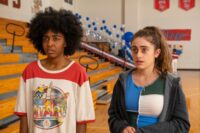Rock biopics might be the most contentious of all the subgenres of rock films. A single great lead performance might make or save an otherwise tepid film; a poor one can sink even a decent effort. Casting is crucial and can make a breakout star of a no-name performer or elevate even an established star’s resumé. No biopic need hew strictly nor solely to the recorded facts of history; stray too far, though, and critics and fans alike will send the film straight to the DVD dustbin.
So what makes for a great rock biopic? Well, it takes a lead performance that channels the energy of its subject. No one wants to see a film that lacks the charisma of the very performer it aims to present. Physical appearance can help and can be, at times, almost uncanny, but the best performances transcend likeness and mimicry to convey the star’s distinct persona. Also crucial is a good script, one that does more than regurgitate a singer’s Wikipedia bio and focuses more tightly on a specific period or episode. A tight edit (sorry, Bohemian Rhapsody) can keep the pace as spry as a two-and-a-half minute single.
But above all, the best rock biopics present themselves not just standard docudrama fare but the sheer energy and charisma of rock and roll itself. Maybe they do so with musical sequences, maybe with pace and chutzpah, maybe with the lead performances themselves. Curiously, rock biopics weren’t even really “a thing” until late in the 1970s, when the musical genre was well into its third decade, though rock and roll had already made a big splash onscreen in both fiction films and documentaries (our two prior lists in this series of four articles) since the 1950s and ’60s, respectively. Here are ten films, plus some honorable mention picks, that put the rock and roll into the rock biopic genre.
10. Walk the Line
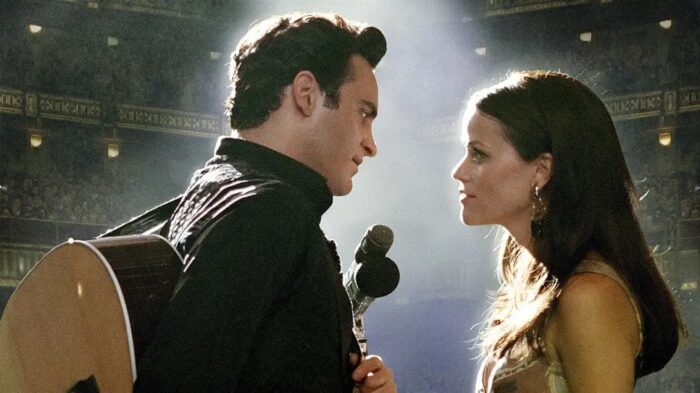
A runaway critical and commercial success, James Mangold’s fine Walk the Line had its origins in the unlikeliest of places: a 1993 episode of Dr. Quinn, Medicine Woman in which guest star Johnny Cash and writer James Keach discussed prospects for a motion picture based on the singer’s early years. It took more than a decade—and Cash passed away in the interim—but eventually the project made it to the screen with Joaquin Phoenix as Cash and Reese Witherspoon as June Carter. Neither actor had played nor sung to any degree before the film, but both gamely learned their instruments and gave it their all vocally, making for credible performances, earning them a pair of lead Oscar nominations and a win for Witherspoon. It wasn’t just mimicry that the two channeled, though; it was a genuinely crackling sexual and romantic chemistry that made for an engrossing paean to country’s king and queen. Wisely limiting the story to Cash’s early years, his ascent to fame, struggles with addiction, and falling for Carter kept the film as tightly focused as one of Cash’s great story-songs.
9. The Runaways
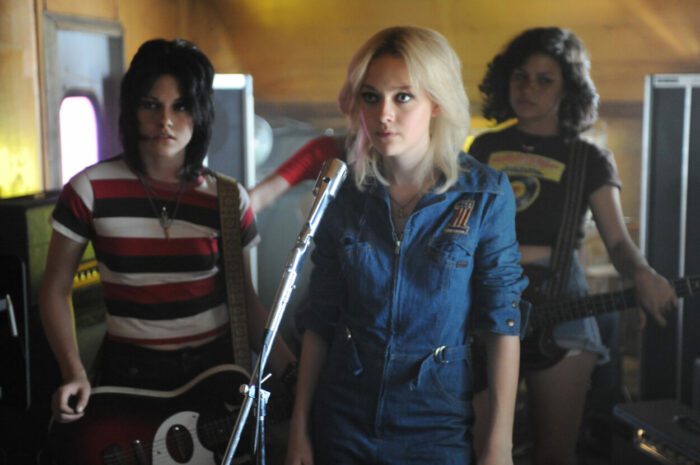
I won’t claim The Runaways to be great art, but it has a lot going for it, starting with its inspired cast. Kirsten Stewart as Joan Jett? Now that K-Stew is an acclaimed actor with an impressive resume of arthouse performances and an Oscar nom it makes sense that only she could play a range of personalities as diverse as the Runaways rocker, Princess Diana, and Nouvelle Vague icon Jean Seberg. But back in 2010 she was still saddled with her Twilight-era baggage. Dakota Fanning is raw and affecting as Cherie Currie—the film is based on her book—and Alia Shawkat and Michael Shannon deliver in supporting roles as bandmate Robin and manager Kim Fowley. Director-writer Floria Sigismondi charts the group’s ascent in a glorious boozed-up haze of Super-16 ’70s-era drugs and sex before things fall out and get bitter; the film’s runtime allows for an all-too rare examination of the rue and melancholy that can accompany a young woman’s—these young women’s—quick rise to a brief fame. Stewart’s Joan Jett would manage to extend that fame into a long stardom or jukebox hits and arena tours. Fanning’s Currie, would suffer mental illness and a challenging recovery, one treated with empathy and accuracy, to the actor’s and Sigismondi’s credit. Few rock biopics take the mental health of young women as seriously as The Runaways.
8. La Bamba
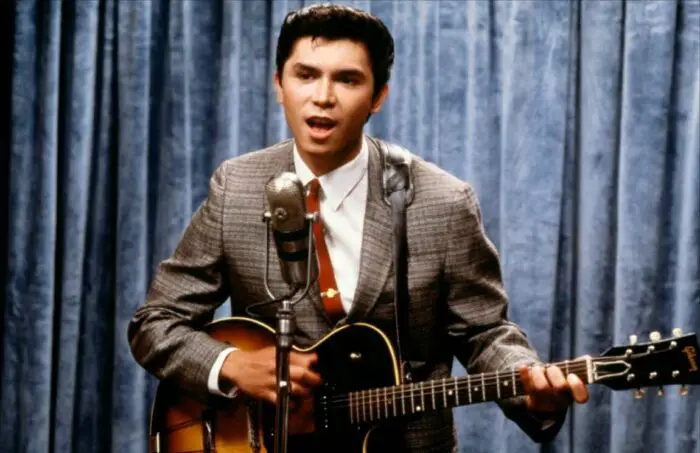
Made for a mere $6.5 million into a sleeper box-office hit, director Luis Valdez’ La Bamba, the story of breakout Latino star Ritchie (Valenzuela) Valens, followed the formula laid out by the prior decade’s The Buddy Holly Story to perfection. Like that film and the tragic connection it shares with it, La Bamba keeps its focus on friends and family as the star comes quickly of age and, sadly, dies too young. La Bamba benefits from an authentic soundtrack led by Los Lobos (at the request of the Valenzuela family), some knockout cameos (Brian Setzer as Eddie Cochrane, Marshall Crenshaw as Buddy Holly), a great supporting cast led by Esai Morales as Ritchie’s older brother, and a pitch-perfect lead from Lou Diamond Phillips, who conveyed the young phenom’s sincerity and creativity with aplomb, lending some long-need Hispanic representation to the big screen.
7. I’m Not There
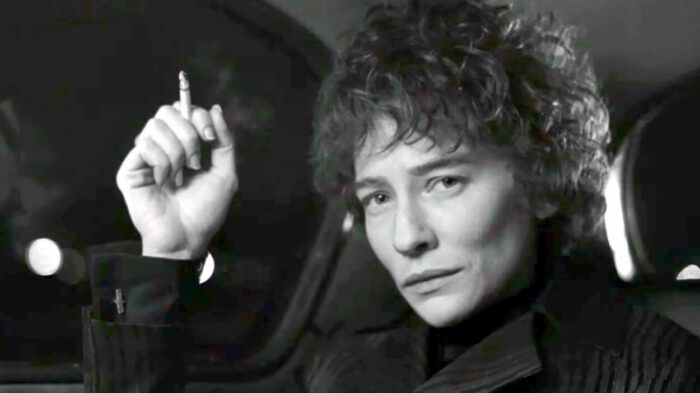
Two picks following I’m Not There on this list—Rocketman and 24 Hour Party People—have their share of cinematic and narrative invention. But no rock biopic to date takes the risks queer-cinema provocateur Todd Haynes does here, casting six different actors, five men and one woman, in the lead as Bob Dylan, though never mentioning him by name. The six leads all portray different facets of the singer’s famously chameleonic personality, some of them fictional, others less so. Curiously, casting Cate Blanchett as the Dont-Look-Back-era Jude Quinn seems less a stretch than does plunking Richard Gere, of all people, into the role of Peckinpah-era Billy The Kid. Six actors depict different facets of Dylan’s public personas: Christian Bale, Marcus Carl Franklin, Ben Whishaw, and Heath Ledger, in his final film to be released during his lifetime, play the others. The film’s central conceit isn’t one others have copied, except to a far lesser degree in Love and Mercy, which featured Paul Dano and John Cusack as differently-aged Brian Wilsons. I’m Not There may be an acquired taste, but it’s an intriguing arthouse approach to standard biopic fare and fully worthy of the shapeshifting nature of its enigmatic, elusive subject, whose own persona was itself an ever-changing guise.
6. Sid and Nancy
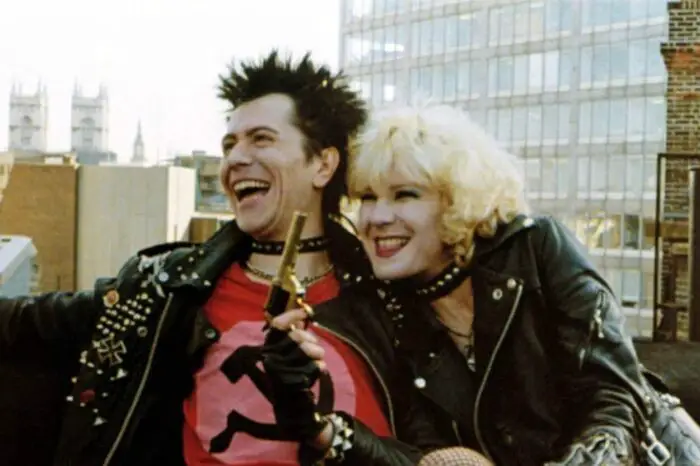
R.I.P. Nancy and Sid. Sorry if that arrives as a spoiler alert, some three and a half decades after Alex Cox’s excellent film and four and a half following the death of its principals, but it’s a punk-appropriately blunt epitaph at the end of Sid and Nancy, the story of a profoundly dysfunctional romantic relationship in the guise of a rock biopic. The film opens with Nancy Spungen’s (Chloe Webb) death by heroin overdose in 1978 and her boyfriend Sex Pistols’ ex-bassist Sid Vicious’ (Gary Oldman) questioning by the police. Cox flashes back to the prior year and Sid and Nancy’s tumultuous, drug-fueled relationship, one which dragged them both into the throes of addiction and broke up the band at the height of their brief fame. Though neither was the first choice for the role (the film might have starred Daniel Day-Lewis opposite Courtney Love), Oldman and Webb imbue their drugged-up characters with a dimensionality other directors might have overlooked; their attraction to each other—and to drugs—is palpable. There’s no music from the Pistols, but the Pogues, Joe Strummer, and others of the era, and Oldman delivers on his interpretation of Vicious doing Sinatra’s “My Way” to make for a credible simulacrum of the late-70s London punk scene.
5. Rocketman
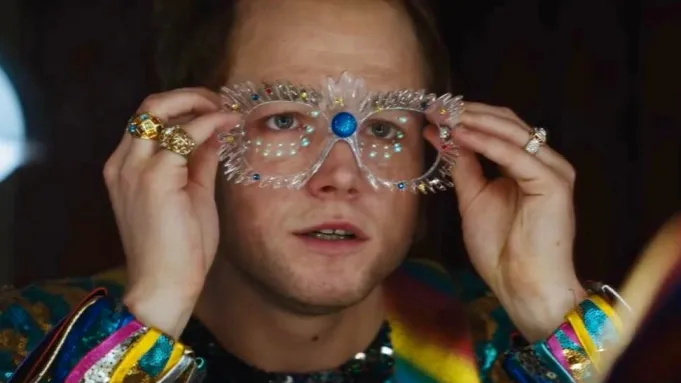
Like its charismatic, technicolor subject, Rocketman does not stick strictly to the tried and true, the straight (ahem) and narrow. It’s in a way a jukebox musical, reassembling fragments of Elton John’s life into an achronological but nonetheless cohesive narrative framed by his big hits (of which there are dozens) and deep cuts (of which there are dozens more). That way, from the film’s very start, where Elton—played by a game, heady Taron Egerton—enters a rehab facility to the tune of “The Bitch Is Back,” there need be little obeisance to the strict confines of chronology. Instead, there’s far more of a focus on psychological and cinematic impressionism, letting Elton’s music fly into fancy, like it does when his performance of “Crocodile Rock” at the Troubadour in L.A. is so rapturous it sweeps the performer literally off his feet. Rocketman doesn’t shy from Elton’s sexuality or addictions, nor does it exploit them; rather, its sheer exuberance captures its subject’s manic highs and near-fatal lows with a panache few rock biopics have managed.
4. Straight Outta Compton
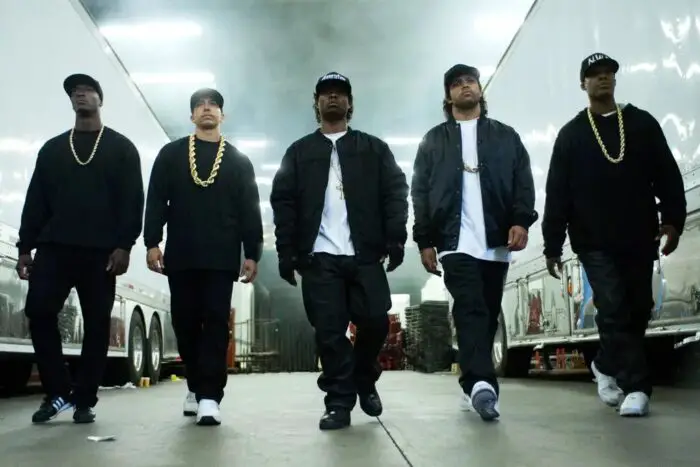
F. Gary Gray’s chronicle of the rise and fall of N.W.A had the blessings of the original group, including Ice Cube, Dr. Dre, and Eazy-E’s widow Tomica Woods-Wright, as producers and MC Ren and DJ Yella as creative consultants. Ice Cube’s own son, O’Shea Jackson Jr., made his film debut playing his famous father. Even so, controversies dogged the film from start (a colorist casting-call) to production (an infamous hit-and-run) to distribution (Jerry Heller’s later-dismissed lawsuit). Despite those, and despite the same kinds of historical inaccuracies that mark biopics from The Buddy Holly Story onward, Straight Outta Compton hit nerves and sold tickets, making it a box-office hit and a candid biopic of a group of young men falling in and falling out. Its musical performances hit the mark; only in its melodramatic telling of the death of Eazy-E does it start to lose a little of its steam. Until then, Gray and Spike Lee vet cinematographer Matthew Libatique cleverly code-switch between rap-video and ‘hood-film aesthetics to craft an origin story worthy of a superhero teamup. These cats came straight outta Compton to invent gangsta rap, piss off the Feds (and Tipper Gore), and thrill their audiences, something this film just gets.
3. 24 Hour Party People
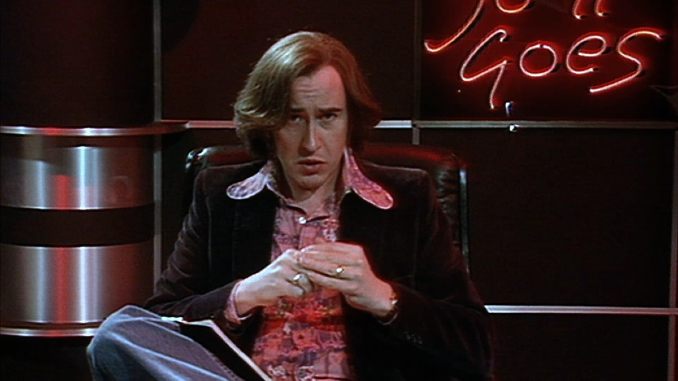
Unlike every other biopic subject on this list, Tony Wilson wasn’t a rock singer. But he was in his own way, as a promoter and television personality, every bit as charismatic and outrageous as an Elton John or an Elvis Presley. Director Michael Winterbottom’s feature plays as fast and loose with the facts as Wilson apparently did as an impresario, earning 24 Hour Party People a spot on this list for its inventiveness and energy alone. From the late-1970s punk scene to the ’80s rave and DJ culture to the Madchester ’90s, 24 Hour Party People keenly employs Wilson (Steve Coogan) as host and emcee, a philosophy student-cum-journalist who becomes head of Factory Records, guiding the careers of Joy Division, New Order, Happy Mondays, and others. Breaking the fourth wall frequently, shot on digital video, interspersing actual concert footage (hey, hello, Sex Pistols!) and featuring no small amount of improvisation from its talented cast, Winterbottom’s film may crack jokes but ends up being a sincere love letter to a time and place.
2. What’s Love Got to Do with It
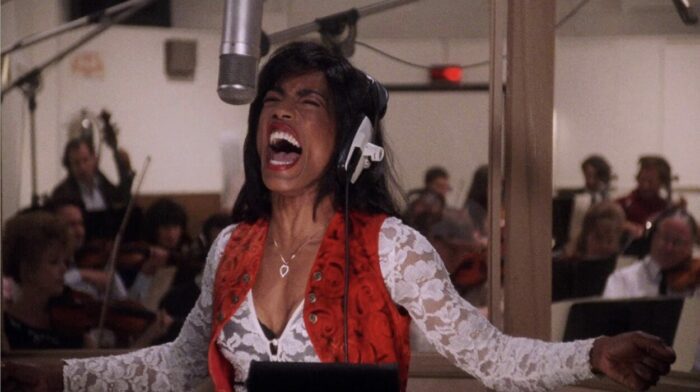
Sometimes in casting a rock biopic, an actor’s genetics make for a compelling resemblance: it’s no surprise that O’Shea Jackson Jr. makes for a convincing Ice Cube, for instance. In other circumstances, a few props, like Buddy Holly’s oversize choppers and a pair of specs, will let a Gary Busey make for a credible impersonation. Or a director might go the Todd Haynes route and forgo physical approximation nearly entirely. In the case of What’s Love Got to Do With It, little about Angela Bassett makes for a physical resemblance to Tina Turner, but the actor makes the film sing with her intensely kinetic performance, both on and off stage. A latecomer to the role after Halle Berry, Robin Givens, Pam Grier, Janet Jackson, and Vanessa L. Williams were all considered—and Whitney Houston was given the role but pulled out due to her pregnancy—Bassett gave the role every ounce of shimmy-shake Tina did her own powerhouse performances. Laurence Fishburne equally commanded the screen as the abusive Ike Turner. As is so often the case with biopics, nearly none of the principals depicted was happy with the result, given its creative license with the facts of the singer’s autobiography, I Tina. But it’s a compellingly told, beautifully acted, and harrowing tale of survivorship set in one of the great eras of rock music.
1. The Buddy Holly Story
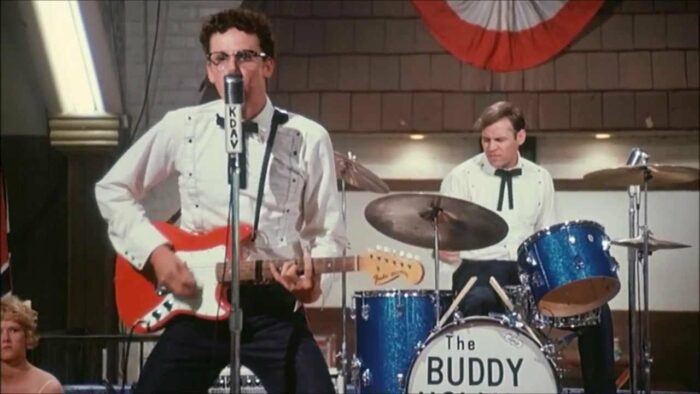
To rewatch The Buddy Holly Story today—as I did upon a recent visit to Clear Lake, Iowa and its magnificently restored Surf Ballroom where the bespectacled star played his last gig—is to marvel at its 1970s-era earnestness, a story told in straightforward reverence without experimentation or invention. Steve Rash’s film starts with the singer’s teen years in Texas, takes him from high-school girlfriends and best-bud roller-rink gigs to New York stardom and a mature relationship with his young, pregnant wife Maria Elena (Maria Richwine) as young Buddy Holly navigates the music world with a singular intensity before tragedy strikes at the worst of moments. It would all seem formulaic were it not for the fact that there really were no rock biopics of note before The Buddy Holly Story: it literally created the template for dozens of films to come, and it did so on the broad shoulders of its breakout star, Gary Busey, who may not have resembled the Texan teen but so fully realized his intensity and integrity he made this film, all geeky, slinky, snappy rock and roll, what it is: a joyful celebration of a musical form and an elegy for the “day the music died.”
Honorable Mention: Seen all these? 1976’s Bound for Glory predated The Buddy Holly Story by a couple of years and features a fine performance by Keith Carradine as Woody Guthrie. Oliver Stones’ The Doors (1991) is by no means a great film, but it’s nonetheless an interesting watch with an all-in performance from Val Kilmer and a killer soundtrack. Baz Luhrmann’s Elvis (2022) has its fans and champions, though I do not count myself among them. Great Balls of Fire (1989) Ray (2004), Get On Up (2014), and treat ’50s pioneers Ray Charles, James Brown, and Jerry Lee Lewis well, and Backbeat is a smart film about The Beatles’ Hamburg days. All of them are worth watching.
Don’t Bother: I can’t say the same for Bohemian Rhapsody (2018), though Rami Malek will make you feel at least like you haven’t wasted your time. If you’re a Queen fan, though, you’re probably better served by Spotify. Last year’s I Wanna Dance with Somebody is everything a rock biopic shouldn’t be: tepidly performed, poorly written, and excruciatingly dull.
Coming Up: Next up in our series of Fave Rock films is our list of 10 Favorite Performance films, featuring footage exclusively (or at least mostly) of performers on stage, bringing their talents to bear on the big screen. Stay Tuned!



